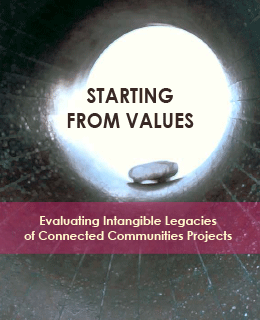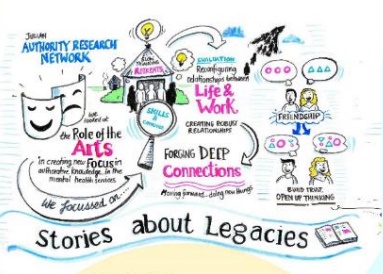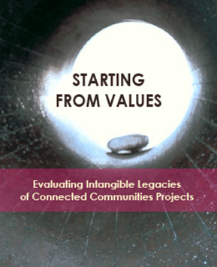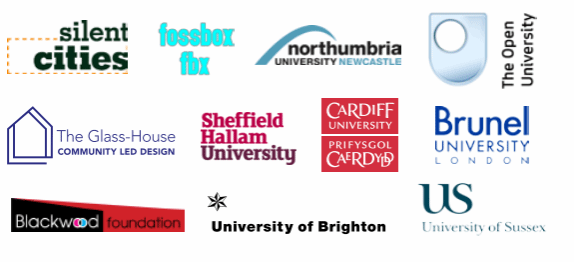

Starting from Values - Evaluating Intangible Legacies
Keywords: shared values// legacies // values-based evaluation// social legacies // community impact// transdisciplinary research
Funded by: UKRI: AHRC (Arts & Humanities Research Council)
Key team members: MKH; EH; GB
Key Contributions to WeValue Platform Knowledge:
This project made a leap. It proposed that if people first clarified their group shared values (e.g. using the new WeValue emerging method) then… that might allow them a valuable lens to view impacts from projects OR government policies OR events…
And it worked!
Non-academic and academic partners first crystallized their ‘group shared values’ and then turned their attention to thinking about legacies of their projects. The results: they identified 3-5 times more legacies than previously, with clear reasons why they were valuable.
Because of this project, we now knew that the WeValue approach had a second strand of great usefulness: to help people to view aspects of their lives (like a project, OR government services, OR their organizational performance) through a shared-values lens, and identify and make explicit otherwise less-tangible information. We went on to use this premise in many other applications.
Relevant papers published: 10,13,15 in the Publications List
Official websites GtR https://gtr.ukri.org/projects?ref=AH%2FL013142%2F1&pn=0&fetchSize=10&selectedSortableField=date&selectedSortOrder=DESC
This is the UKRI site, including much detail about the purpose, results, impact, partners.
Official purpose:
This project was focused on identifying otherwise-intangible legacies of several projects previously funded by UKRI: AHRC which had large ‘community’ components. Since the funding was public money, it was necessary to ‘make tangible’ the society-based impacts, to parallel the academic ‘outputs’.
We set out to explore the following question: ‘what difference have Connected Communities projects made: what are their legacies?’ Community-engaged research tends to be evaluated in research terms. This does not reflect the broader legacies for all partners and participants. ‘Starting from values’ re-sets the balance and provides a mechanism for understanding and valuing different perspectives. It also gives space and a language to articulate less ‘tangible’ aspects of project legacies. A values-based approach to understanding the legacies of community-engaged research can unearth ‘new’ legacies and a deeper understanding of ‘known’ legacies; enhance existing legacies; create confidence to articulate broader and deeper aspects of legacies; and enhance collaborative working within partnerships.
The aim of this research was to co-explore, co-develop and co-generate a values-based approach for understanding and evaluating ‘intangible’ achievements and legacies of projects. In this way, we also aimed to identify, and legitimise, different `ways of knowing’ that are not usually recognised in traditional project evaluations.
The project had the following specific objectives:
·To explore ways in which creative and arts-based approaches can open up delicate spaces for communication, making it easier for people to talk about their values and tacit knowledge
·To co-develop loose frameworks for evaluating intangible legacies of wider projects supported by the AHRC Connected Communities (CC) funding stream, and for eight specific projects in particular
·To build participants’ capacity to contribute meaningfully to design-based activities within the project, and their ability to design evaluations across many CC projects
·To similarly explore the influence of at least two of these CC projects in wider arenas
·To contribute to arts and humanities scholarship in authority and voice, and thus to wider conversations about the value of co-research approaches.
Project findings and impact
This was a complex, multi-layered project whose findings and impacts could be understood on several levels:
Learning about different ways of eliciting values
The Starting from Values project team has designed a variety of different tools and methods for helping people to understand what their values are, as a first step towards values-focused evaluations. These include, among others, mind-mapping using pen and paper and/or MindGenius software; designing a ‘Values and Goals’ mapping chart made of foldable felt; developing digital collaboration tools for co-creating values statements; and using individual or collective drawing as a starting point for reflection.
Learning how to link values, measurable indicators, and legacies
We have developed sets of prompts that can be used by project groups to help them develop their own measurable indicators, and then collect data on these indicators in order to understand their legacies better. When used after the values elicitation step, the prompts can inspire people with new ideas that they hadn’t previously thought of.
Data on project legacies themselves
The main project strand brought together partners from two Connected Communities projects: The Authority Research Network and Scaling-Up Co-Design. Their legacies included, among many others:
·deep and sustained friendship networks, which give researchers a safe space in which to test out highly creative or ‘risky’ ideas;
·renewed energy, helping people and organisations to continue with activities that would otherwise have been abandoned;
·increased self-esteem and confidence, enabling people to ‘scale up’ their vision, overcome their fears and aim for more ambitious goals;
·greater recognition of skills and expertise, giving people and organisations more credibility (e.g. for funders).
Formal documents and publications
 https://cris.brighton.ac.uk/ws/portalfiles/portal/364166/Starting%20from%20Values_Legacies%20booklet_WEB.pdf
https://cris.brighton.ac.uk/ws/portalfiles/portal/364166/Starting%20from%20Values_Legacies%20booklet_WEB.pdf
Starting from Values_Legacies booklet_WEB.pdf
11Starting_from_Values_Legaciesbooklet_WEB.pdf
Project Final Report: Starting from Values: Evaluating Intangible Legacies-
Starting from Values: Evaluating Intangible Legacies
This is a beautiful, must see, very easy to follow report which is a pleasant journey through the project…please take a look!
Book Chapter
Brigstocke, J., Hoover, E., Harder, M., Graham, P., de Sousa, S., Dearden, A., Light, A., Zamenopoulos, T., Alexiou, K., Burford, G., Gaubert, J., & Fosket, C. (2017). Implicit values: uncounted legacies. In K. Facer, & K. Pahl (Eds.), Valuing interdisciplinary collaborative research: beyond impact (pp. 65-83). Policy Press. https://policypress.co.uk/valuing-interdisciplinary-collaborative-research#book-detail-tabs-stison-block-content-1-0-tab1
Further information
The idea of identifying legacies was a strand of work developed in the Starting from Values project. It was one of seven recently funded in a call for developing different ways of investigating the legacy of Arts and Humanities Research Council (AHRC) Connected Communities projects.
The project has led to new ways of defining ‘legacy’, lending legitimacy and authority to previously unheard or less ‘tangible’ legacies of Connected Communities projects, and contributes to wider questions on shared values, authority and legacies in collaborative research projects.
Why starting from values?
The question of legacy is closely connected to the values of different stakeholders, yet these values are rarely discussed openly, and many are not considered measurable in tangible ways. As a result, traditional evaluations tend to reflect the values of donors or governments, and what can be easily measured, rather than considering what project partners may be striving to achieve.
Project partners include community and academic investigators with experience or an interest in values dimensions of collaborative research projects, a desire to understand and capture related legacies, and expertise in the areas of values-based indicator development, authority research and the role of arts-based methods in understanding different ‘ways of knowing’.
Project impact
They have been used to assist 10-20 civil society groups, NGOs and community groups to reflect on the legacies of their projects, including 10 AHRC Connected Community projects. As a direct result, the four main CSOs working with use challenged their Boards of Directors, and asked for changes in them - because the members realised that they were not currently pursuing the values-based legacies that were of priority to them. The findings have been also used to develop other projects, for example on looking at the legacy in villages on the Gross National Happiness movement, in Bhutan and Thailand - a further AHRC project starting in 2016. The findings are in development for use in looking at legacies of businesses in wider communities, as a form of CSR. And they are currently being developed with a mainland Chinese major philanthropical bank to consider how targeted legacies will influence the organisational strategic plan for the next 10 years. Furthermore, our learning in the use of values-based approaches to facilitate group members, such as village committees, to look forward and plan better, has led to a new strand of work in assisting villagers in developing countries (currently Botswana) to do this to enable them to better plan for Climate Change Adaptation - a UN priority (study now published). And similarly, for pre-judging development projects near villages in Nigeria (study now published). From Feb 2019 the findings have been used as a new-generation methodology of public participation, in the UKRI Global Challenges GCRF, £18M 'Action Against Stunting Hub': allowing the shared tacit values of local people in Indonesia, India and Senegal to be taken into consideration in the planning and evaluation of stunting interventions. That work is included in the HUB's five-year work as a Theme (work package).
Update in October 2023: We have now built much further on the foundations of this work, to advance the idea that this approach has potential to capture group shared values and thus to build up a Cultural Themes for a locality which are so concise that they could be used for local indicators of social acceptability. This year we worked with Hong Kong University in a project in Nepal to do this in a village, in order to explore the possibility of developing social indicators for ESG indicators, e.g. for development work evaluation. We have completed the fieldwork and are now analysing the data.
Partners
Principal Investigator:
Professor Marie Harder, Values & Sustainability Research Group, University of Brighton
Academic Co-Investigators:
Dr Katerina Alexiou, The Open University
Dr Julian Brigstocke, University of Cardiff
Dr Theodore Zamenopoulos, The Open University
Community Co-Investigators:
Colin Foskett, Blackwood Foundation
Justine Gaubert, Silent Cities
Dr Paula Graham, Fossbox
Sophia de Sousa, The Glass House Community-Led Design
Research Assistants:
Elona Hoover, Values & Sustainability Research Group, University of Brighton
Gemma Burford, Values & Sustainability Research Group, University of Brighton
Advisers:
Professor Andrew Church, University of Brighton
Andy Cheng, University of Sussex
Professor Andy Dearden, Sheffield Hallam University
Dr Busawayan Lam, Brunel University
Professor Ann Light, University of Sussex (formerly Northumbria University)
Partner institutions:
 Blackwood Foundation
Blackwood Foundation
Silent Cities
The Glass House Community-Led Design


